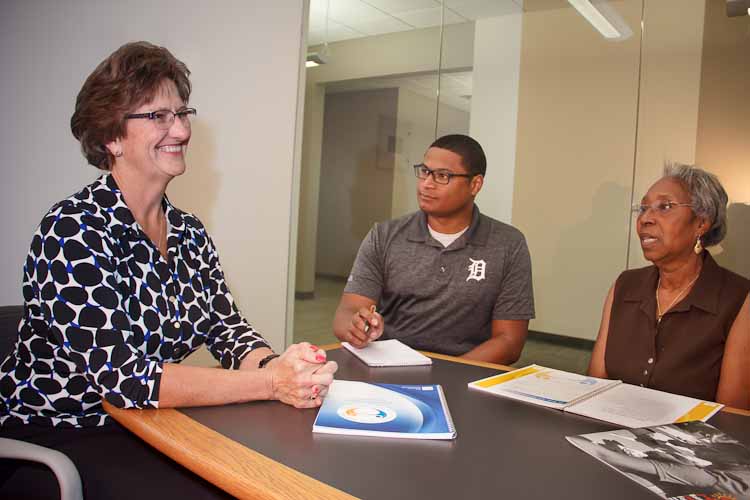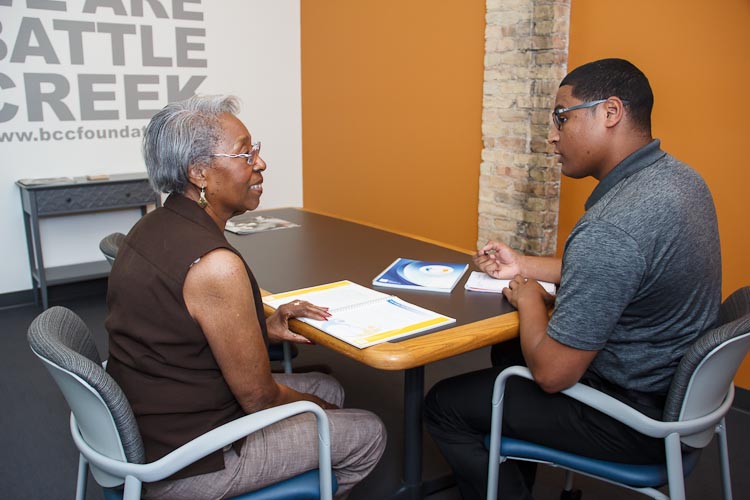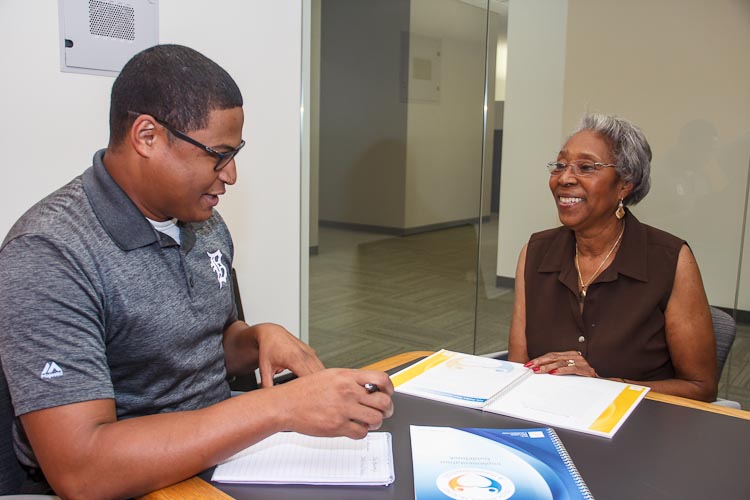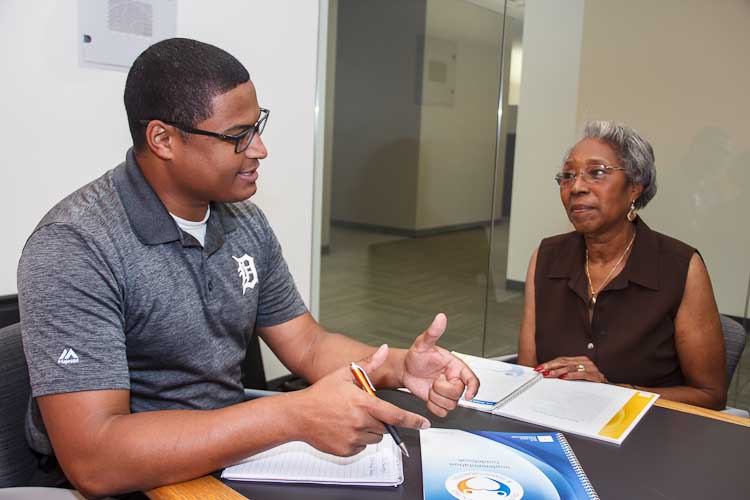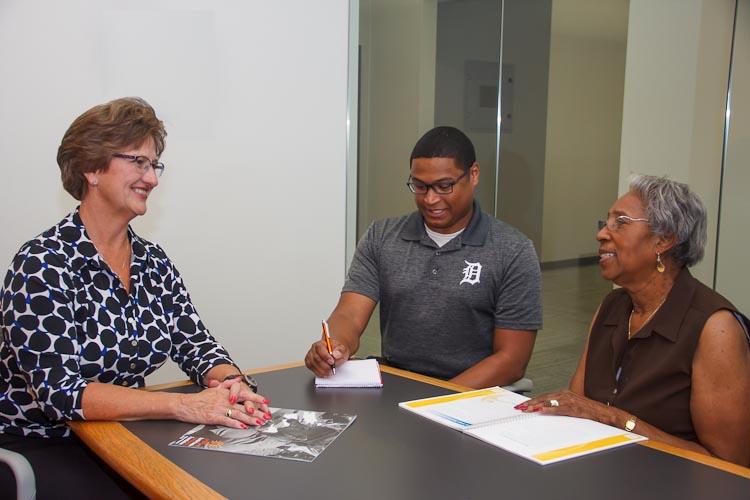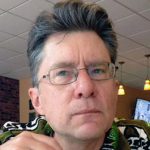In racial healing work, Battle Creek looks for ways to bring everyone together
Battle Creek is finding a way to talk about Truth, Racial Healing and Transformation.
Imagine if all residents of a city could communicate, really get to know each other, like family members.
“That would be wonderful!” Dorothy McClendon exclaims.
In a family, communication is essential, she says, “to listen and be in the now with what the person is saying, and recognize that you can have different opinions about something, but you don’t devalue the person.”
McClendon is a Battle Creek Community Foundation trustee, and a member of reading/discussion group Sacred Conversations. She also was a member of the Battle Creek delegation who attended the W.K. Kellogg Foundation’s Truth, Racial Healing and Transformation summit in California last December.
On a very cold day, Jan. 17, McClendon and other Sacred Conversations members stood out on Battle Creek sidewalks holding large red hearts, part of a National Day of Racial Healing. (Read about Kalamazoo’s events that day here.)
If anyone asked why they were out in the cold with red cardboard, the heart-holders would say, “It’s about treating each other how you wanted to be treated. It’s about loving each other. It’s about looking at each other through the eyes of equality. It was wonderful,” she says.
Heart Matters
Bringing about “transformation, and truth, are really heart matters as well as intellectual exercises,” McClendon says.
But to do more than what she calls the “baby steps” of progress the city’s been making in overcoming racism in her 50 years as a Battle Creek resident, organization and funding are also needed.
The W.K. Kellogg Foundation announced in July that communities around the country will share $24 million in grant money, as part of the Truth, Racial Healing and Transformation effort. Michigan gets the bulk of it, with grants going to Kalamazoo, Flint, Lansing and Battle Creek.
The Battle Creek Community Foundation will get $250,000 in grants, with $25,000 for the first year, and $50,000 going into an endowment plan “to sustain grassroots work,” BCCF CEO Brenda Hunt says.
Battle Creek is just getting started with the TRHT, Hunt says. “I’ll be the first to say that we’re not as advanced into the whole process and goal system as Kalamazoo….. But our overall goal is to build trust in the Battle Creek community by convening community members for dialog.”
Since becoming involved in the TRHT process, the BCCF has “been very reflective, very careful,” Hunt says. She wants grassroots groups involved, including a wide-swath of community members. The steering committee is taking “real caution… to not make decisions without really engaging in the community. We’re really looking at working with a facilitator to look at what that means and looks like.”
Grant money will fund “meetings that would help bring the community together, and training for facilitators who’ll lead the dialog,” she says.
The WKKF is allowing communities to develop their own ways of bringing about, with their own focal points of, Truth, Racial Healing and Transformation — for example, Minneapolis/St. Paul is delving into the police shooting of Philando Castile, and Chicago is energizing its community organizing tradition.
What should Battle Creek’s TRHT be?
Hunt says that the community should be involved in developing its TRHT focus, “instead of a small group defining exactly what we want to go after.”
But when it comes to issues on equality, or the lack of, in Battle Creek, “you pick any one of them, and there’s work to be done,” she says.
“Battle Creek is a great place to live, but underneath the things you love on the surface, we are still struggling with particular issues,” Terry Burleson says.
Burleson was also a part of Battle Creek’s delegation to the TRHT summit. He is the program manager for the Battle Creek College Access Network, helping to guide the city’s youth onto a college-bound path.
The city’s a great place, but Burleson says there are “tensions that I have noticed being born and raised in Battle Creek as a biracial male.”
He points to recent studies that show discrimination in housing, and segregation by class and race in the school system.
“Clearly, you can point to different reasons for that, there are a couple, but still that information is there. And we are challenged to address it,” he says.
There is no way to say “segregation is healthy for a community,” Burleson says, “and there is no true movement unless we all move together — being separated and segregated puts us in silos, and over time we lose the connection and more importantly the understanding that comes from living together, raising our kids together of all different races and classes.”
McClendon also lists education and housing as issues that need to be addressed, as well as the Battle Creek police department’s relations with the community. She gives credit to Chief of Police Jim Blocker, who also attended the summit. “He recognizes that there need to be changes in the way law enforcement interacts in the community, with minorities.”
She adds that it’s nothing new for Battle Creek groups to study and talk about these issues. “But we need to identify who’s doing what, pull those people together, let’s expand and open up those groups to other folks coming in, because change will only happen if the grassroots buy into it, you know?”
McClendon hopes the TRHT effort will lead to more coordination. “It’s like having a big pie. Everybody takes a slice, and you don’t know who took the slice before you got there.”
Talking, healing
For the past eight years, McClendon’s Sacred Conversations has been active as a “multi-ethnic and religious group involved in having sacred conversations on race, and recognizing it’s not enough for just us to reach a point of truth and sharing our stories and histories, but that we should invite other people into the group.”
“We didn’t call it a ‘healing circle,’ but that’s exactly what we did,” she says. “We reached a point where we became family. As we tell our stories and we read books, we share who we are. So we know each other at a depth that functional families know each other.”
McClendon and Burleson participated in the healing circles at the TRHT summit. “Folks I had never met before from all across the nation — we were hugging by the end,” Burleson says.
He learned that “I cannot fully base my opinions” from just his experiences. One has to listen to others, learn “the power of our shared stories,” and make connections.
This is what’s needed in Battle Creek, he says, to “build trust with one another. Because without that trust, we could talk forever and not go anywhere.”
It’s going to be a challenge, Burleson admits. “There are folks in our community and across the nation that do not believe that race is still an issue, that racism still exists and that there is a need for racial healing to take place.”
This is likely because “there is a lack of understanding in our history,” he thinks. He refers to Santayana’s oft-repeated quote: “Those who do not learn history are doomed to repeat it.”
Can Battle Creek residents be open to meeting and talking about equality and race?
“I believe so, absolutely,” Burleson says.
In his work with Battle Creek high school students, “I see them without any prompt, I see them already engaging in conversations on race, class, privilege, oppression, all of it relates to them.”
Battle Creek is ready, he says. “How do we bring everyone together?” is the question.
Mark Wedel has been a freelance journalist working out of southwest Michigan since 1992. For more information, see his website.
This article is part of Michigan Nightlight, a series of stories about the programs and people that positively impact the lives of Michigan kids. It is made possible with funding from the W.K. Kellogg Foundation. Read more in the series, here.

